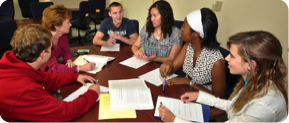WEb-Based Academic Support For Winthrop Psychology Majors

Advising, Course Selection, Registration
Reminders About What You Learned In PSYC 101
Reminders About What You Learned In PSYC 301/302
Internships and Service Learning
Writing Papers for Psychology Classes
Science and Pseudoscience In Psychology
Where to Find Credible Information on the Web
Oral Presentations in Psychology Classes
Resources For Undergraduate Research
Resources for Personal Productivity, Wellness, and Effectiveness
Employment Information for Psychology Majors
Professional Careers in Psychology
Marketing Yourself to Employers
Finding Credible Information on the Web
These pages provide links to other online resources in psychology. They provide a narrower focus that you’ll get with Google or other search engines and have usually been compiled by someone who’s knowledgeable about the topics.
• Articles, Research, & Resources in Psychology: http://kspope.com/index.php
• Psych Web: http://www.psychwww.com/
• Centre for Psychology Resources: http://psych.athabascau.ca/html/aupr/tools.shtml
• PsychCentral, a popular site with a great deal of information about psychological issues, primarily intended for a nonprofessional audience, is at http://psychcentral.com/
• Neurosciences on the Internet by Neil A. Busis, MD: http://www.neuroguide.com/
• The Whole Brain Atlas. This is an amazing resource for neurology and neuroanatomy.
• Classics in the History of Psychology is an effort to make the full texts of a large number of historically significant public domain documents from the scholarly literature of psychology and allied disciplines available on the World Wide Web. There are now over 25 books and about 200 articles and chapters on-line. The site also contains links to over 200 relevant works posted at other sites.
• Social Psychology Network: http://www.socialpsychology.org/
• National Mental Health Information Center: http://www.samhsa.gov
• National Institute of of Mental Health: http://www.nimh.nih.gov/index.shtml
• Research Autism, a UK reseach organization with reliable summaries.
• Edge held its annual 2011 Master Class in Napa, California on the theme: "The Science of Human Nature": Princeton psychologist Daniel Kahneman on the marvels and the flaws of intuitive thinking; Harvard mathematical biologist Martin Nowak on the evolution of cooperation; Harvard psychologist Steven Pinker on the history of violence; UC-Santa Barbara evolutionary psychologist Leda Cosmides on the architecture of motivation; UC-Santa Barbara neuroscientist Michael Gazzaniga on neuroscience and the law; and Princeton religious historian Elaine Pagels on The Book of Revelations. Video and text available here.
• The Association for Psychological Science is a nonprofit organization dedicated to the advancement of scientific psychology and its representation at the national and international level. The Association's mission is to promote, protect, and advance the interests of scientifically oriented psychology in research, application, teaching, and the improvement of human welfare. http://www.psychologicalscience.org
